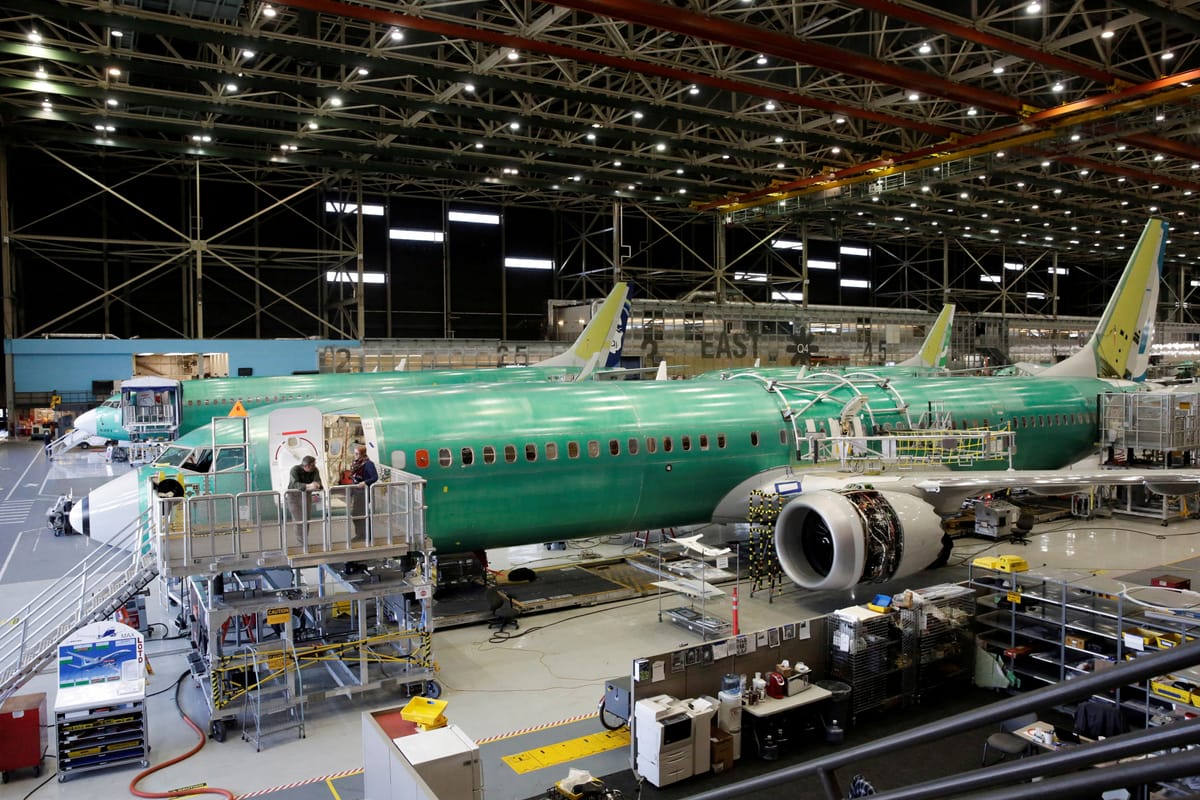Boeing’s troubles keep piling on as its ruined reputation threatens a long legacy
More trouble for Boeing came this week as US regulators told airlines to check the door plugs on a second Boeing 737 mode.

A few minutes every morning is all you need.
Stay up to date on the world's Headlines and Human Stories. It's fun, it's factual, it's fluff-free.
The backstory: One of the world’s top airplane manufacturers, Boeing, has been in hot water for several years, particularly over its 737 Max line of jets. In October 2018, Lion Air Flight 610 crashed in Indonesia, killing 189 people. A similar crash came in March 2019 when Ethiopian Airlines Flight 302 crashed into the waters northeast of Jakarta, killing 157 people. Both of the planes were Boeing 737 Max 8s, one model from the Max line. After these devastating crashes, the 737 Max was grounded around the world for around 20 months, costing Boeing more than US$20 billion and leading lawmakers to pass new laws on airplane certification.
More recently: On January 5, Alaska Airlines Flight 1282, carrying 171 passengers and six crew members, had to do an emergency landing 20 minutes after taking off from Portland International Airport when a door plug came loose, opening a hole in the aircraft’s fuselage while it was about 16,000 feet above sea level. Luckily, no one was seriously injured. This time, it involved a Boeing 737 Max 9, which had been operating since October 2023, according to FAA records. Afterward, more Boeing planes were grounded for safety checks, leading to hundreds of canceled flights. Shares of Boeing also tumbled when the market opened the following Monday, and United Airlines announced it had found more loose bolts on some of its Max 9 airplanes.
US regulators said earlier this month that they’d boost oversight of Boeing’s manufacturing, and several airlines also came out to say they’d put their own inspectors on the ground at Boeing’s plants.
The development: More trouble for Boeing came this week as US regulators told airlines to check the door plugs on a second Boeing 737 model, where operators had also found some issues with loose bolts. On Tuesday, Reuters reported that Boeing sent a memo last week to its suppliers with guidelines on making sure bolts on the company’s planes are properly torqued.
But also on Tuesday, United Airlines CEO Scott Kirby said Boeing needs “real action” to restore its reputation. The airliner has 79 Boeing 737 Max 9 planes, and it announced on Monday that it’s expecting to lose money in the first quarter of the year because of the groundings. In an interview with CNBC, Kirby said the airline was even reconsidering flying Boeing’s Max 10, which it’s already placed orders for, although the model hasn’t been certified yet.
Key comments:
“We’re going to approach this – No. 1 – acknowledging our mistake,” Boeing CEO Dave Calhoun told employees during a companywide meeting on January 9, referring to the Alaska Airlines incident. “We’re going to approach it with 100% and complete transparency every step of the way.”
“We support all actions that strengthen quality and safety and we are taking actions across our production system,” Boeing said in a statement regarding increased oversight and checks from US regulators.
"Ensure that work instructions are mistake-proof and quality is continuously monitored - particularly torquing requirements," said the memo from Boeing to its suppliers sent late last week, according to Reuters.
“I think the Max 9 grounding is probably the straw that broke the camel’s back for us,” United Airlines CEO Scott Kirby said in an interview Tuesday with CNBC. “We’re going to at least build a plan that doesn’t have the Max 10 in it.”
“They have an ongoing quality control issue and it’s systemic and it runs not just through the 737 program,” said Darren Straker, the former head of aircraft accident investigations for the United Arab Emirates and Hong Kong, who most recently worked for Chinese planemaker Comac. “And it’s largely due to the fact that they subcontract major airframe component manufacturing and quality control to their independent contractors.”
“What made it a great company is it built the greatest airplanes in the world,” said Paul Adams, a former president of aero-engine maker Pratt & Whitney. “As a result, people needed their product. And they had long-term sustainability. When they went to the mode of trying to optimize financially, they lost the DNA that made them a great company.”




Comments ()